Issue Number 30, Fall 2015
Contents
- The Thing With Feathers by Mark Tredinnick
- Red Moon Eclogues by Mark Tredinnick
- Reading the Entrails by Mark Tredinnick
- Paradise Eclogue by Mark Tredinnick
- Biloba by Rolf A. Leeman
- Canada Geese by Paul Nelson
- Cherokee Fields by Dave Worrell
- Contrail by Bob Perkins
- Crossing the Wallace Line by Sandra Noel
- Hashim by Tim Applegate
- In Seven Erstwhile Cities by Cal Freeman
- Letter to Mardie Ratheau
Marlboro, Vermont by Susan Lanier - Migration by Cathy Barber
- Morning News by Andrena Zawinski
- My Daily Crows by Erica Goss
- Not One Thing Bright by Florence Dacey
- On the Beach by Valerie Nieman
- River Trail by Susan Kelly-DeWitt
- Strawberry Mulching by Kevin Casey
- We Dig the Graves by Carlie Hoffman
Archives: by Issue | by Author Name

The Thing With Feathers
“Hope” is the thing with feathers—
That perches in the soul—
And sings the tune without the words—
And never stops—at all—
—Emily Dickinson, “Poem 264”, 1861
by Mark Tredinnick
Mark lived for many years in the Blue Mountains, sandstone canyon country west of Sydney, Australia. After that he lived (and wrote many of these poems) in pastoral country on the banks of the Wingecarribee. In the last year or so he's lived in Newcastle, a steel city on a working harbour at the mouth of the Hunter, and just of late he's settled in Picton, a small town on the Wollondilly.
Listen to The Thing With Feathers
Excerpted from the recording The Road South from River Road Press.
I
The sky fell on the Myall River last night and all along the coast
and in a wide fetch out to sea rain fell too like some
new order of things upon the end of time and somewhere underneath
that vast depression the moon grew round and it rose and it raised a king
tide higher yet than it would have risen on its own and the wind drove the sea
upriver.
By twelve the river had taken the wharves and by one it had taken the road
and by two it lay down on the steps of the pub and gave in till morning came and
carried the stream back to its bed again and put the world to rights.
And the rain
still floods the morning out of which the river falls and the weather’s
dropped anchor over the town, the future in rehearsal.
I sit above
the river and beside me on the pylon a black cormorant spreads wings
in the rain and looks down on the falling torrent and grows slicker than he was
when he left the water.
There’s just no escaping it.
The bird is the maestro
who’s spent more than he walked on with; he drops his arms when the music dies
and slumps into the uproar.
Surrender’s the only proper posture now.
II
The rain falls on and the day waxes while the moon sleeps and the future
slips imperceptibly into the past.
Much bigger rivers than this have emptied
into deserts so that I might sit here in frayed linen shirt and weathered
jeans a foot above the tide and wonder how I’m meant to live
with what I know about the salting of the land and the warming
of the air and the rising of the seas and the coming end
of everything.
It’s hard to make out in the rain among the mangroves
of the other shore, but the vast contraption of the present moment—
the mad machine of modernity herself, the virtual economy of our souls—
what we’ve made of the given world is a delicate and over-wrought conceit,
a monstrous, atrophic piece of industrial plant, which has stood in the weather far
too long;
it’s been running forever on oil and faith and oil and faith are failing.
This, then, is the clever and penultimate mess we’ve made of our time on earth:
the more we get the less we have till time herself is running out.
But listen—there’s weather on the river now like Bach on the radio
and one hopes it never ends.
There’s coffee in my mouth and the whole
day, at least, ahead and I look and the cormorant is gone.
III
Later I come outside and stand again in the perpetual rain and ask
the river how we are hedging our doom.
Twelve pelicans fall from the cloud
and ski for fifty metres to a standstill and something tells me our
landing won’t be as soft.
But what would a river know about doom—in particular,
ours—and what would a pelican do but fledge its young and curse the rain and fish
the river dry?
I sit where I sat this morning and I watch the day drown,
and there’s weather on the river now like a phone call after midnight and grief
is the colour of the bottom of the sky.
There’s weather on the river now like children
in the playground and mercy’s the lamp in the evening’s tent.
She’s the gelatin scrim
on the face of the water, the daub of forlorn incandescence upon
mangroves and fishing boats, the yellow of the pelican’s eye.
There’s weather
on the river now like cluster bombs on Babylon and fear is the wrack line
on the wrong side of the street.
There’s weather on the river now like a change
in the government and hope is the thing with feathers.
And as I watch she turns
and beats her wings and then she walks and then she runs and then she rises
like some plump and indefatigable martyr up into the unending
rain and she passes under the bridge and tracks the river down to the sea,
a thing she’s always done and never stops at all.

Photo by Steve Haimovitz
© Mark Tredinnick

Red Moon Eclogues
by Mark Tredinnick
Mark lived for many years in the Blue Mountains, sandstone canyon country west of Sydney, Australia. After that he lived (and wrote many of these poems) in pastoral country on the banks of the Wingecarribee. In the last year or so he's lived in Newcastle, a steel city on a working harbour at the mouth of the Hunter, and just of late he's settled in Picton, a small town on the Wollondilly.
I
Every year the moon inches away from us. In time she’ll swim too far out
to anchor us at our habitual angle to the sun, and that will be the end
of the well-tempered and recursive wildness
that conceived and suffered us,
and that will be the end of us. We have just two
billion years to thank her for our time here. Eternity has a use-by date
II
But it’ll be up long before that, and in the meantime,
I sit on the cold step of the cowshed and watch the world throw its shadow
on the moon like a horse blanket;
in the meantime the moon reddens
in the refraction of all our dawns and sunsets, in a kind of transfigured cosmic
smog. An apocalypse that lasts three hours until it’s time to go to bed.
III
And in the meantime on the floor of my shed, blue planets sing in the hands
of children as they once sang in war. Two small worlds forged to cry terribly down
like creation unravelling upon one’s foes now
make a peaceful clangour on my secular desk.
One spins from its orbit and quakes and chips its cerulean shell on the floor
of heaven. The tectonics of play. We are loved like this, and this is how it ends.
IV
I’m arguing a lot with death these days. And last night I found myself
in court poised to clinch the case against the absurdity of life.
Certainly, this was sleeping and certainly
I was dreaming and I’d been losing the thread,
but all at once I saw where my argument must run, and I was running it there
when my small boy cried and woke me and I went to him and now I’ll never know.
V
Spring now, and the river has drawn back her bow. The lark ascends
from the cd-player, and black ducks sip brown ditchwater in the yard.
Everything’s in bud or leaf, last of all
the silver poplars and the Osage Orange,
trees flaring even now in the backyard of the childhood of my friend, the poet,
the poet’s son. The world happens twice. Draw the linen string taut and shoot.
VI
One lives in paradox. Debussy plays; trucks flounder past like gods
who’ve lost control of their machines. In between one makes one’s life up.
The sound is the price you pay for the sight
that meets you every morning and half
of what you paid for the house. The shed puts the perfect sky in her pocket,
and possums rut in the roof. Eternity is in rehearsal, and this is its soundtrack.
VII
Brad mows an acre an hour. A general at ease on his machine, a banker
in overalls, he’s rationalized our small republic on one tank of gas. And this now—
cutgrass at four o’clock—is how
hope smells. Some days I can see no way out:
the body of the world in entropy. But today I sit among the ruins
of the afternoon, and I cannot see how it can’t all go on forever.
VIII
Meantime the moon has made herself new again, and there has been rain.
The Marulan hills, which had almost forgotten the taste of the word,
are spelling green again this afternoon,
and there’s water in a lake that’s been a paddock
for a decade. Three black cockatoos, and then three more, fly over as I take
the southwest road. And into all this panoply of hope, the new moon falls.
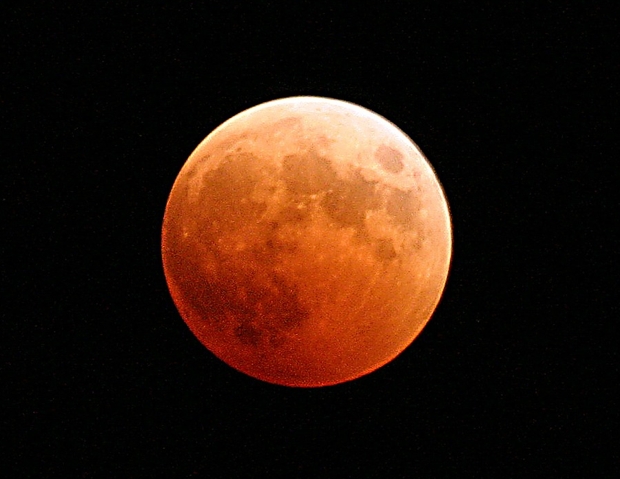
© Mark Tredinnick

Reading the Entrails
by Mark Tredinnick
Mark lived for many years in the Blue Mountains, sandstone canyon country west of Sydney, Australia. After that he lived (and wrote many of these poems) in pastoral country on the banks of the Wingecarribee. In the last year or so he's lived in Newcastle, a steel city on a working harbour at the mouth of the Hunter, and just of late he's settled in Picton, a small town on the Wollondilly.
WE WOKE to white feathers under the orange tree
and the door of the coop aghast.
Our last two hens, those yogis, martyred. Unhappy augury on polling day.
All morning the weather mumbled its sombre oracles.
And I stood within them,
handing out how-to-votes and hoping the birds were the last thing we had to lose
to pay for deliverance this night.
But only the damned are certain.
Well, it turns out the fox just got lucky
and the chooks were just dead
and none of this was a metaphor for anything. It turns out
we didn’t put the fox back in charge of the chookhouse.
You lose enough of what you love, you learn
to bed your virtues safer down
or wake to find them savaged.
It turns out this is just the way
the syntax of the real world runs,
implying one thing, meaning at once another. Meaning everything
ends, the good with the bad. The whole world, it turns out, is a metaphor,
and nature is a blind god’s prophecy.
The hens were innocents; they were also
the regime and they were our better selves.
The last thing we have to lose.
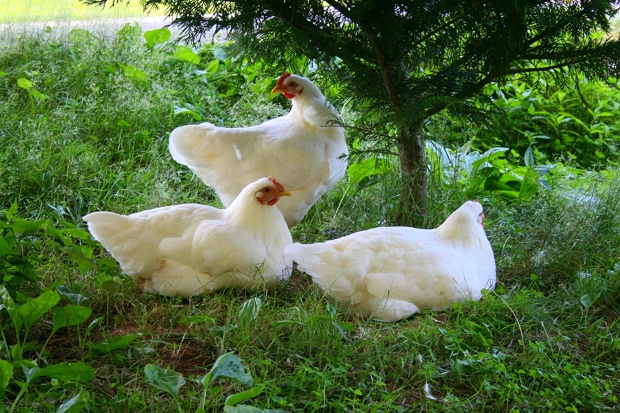
© Mark Tredinnick

Paradise Eclogue
by Mark Tredinnick
Mark lived for many years in the Blue Mountains, sandstone canyon country west of Sydney, Australia. After that he lived (and wrote many of these poems) in pastoral country on the banks of the Wingecarribee. In the last year or so he's lived in Newcastle, a steel city on a working harbour at the mouth of the Hunter, and just of late he's settled in Picton, a small town on the Wollondilly.
ONCE I LAY in the lassitude of summer,
rocking the sky’s slow boat,
looking up the skirts of a sorority of poplars. The wind rose
and the grey leaves panicked
in a silver school and swam south,
But not far south, and the sky above
was a lapis scrim of unbroken
thought. Benazir Bhutto had died on the morning of that day,
all over the world, and I felt guilty
even being here. But there was the gentle sky
And it was going nowhere and blaming no-one fast—a vast intelligence
canvassing nothing special,
drawn taut and candid and empty
over the whole carnal world. A charged void, the flip side of knowledge,
The other side of pleasure, and there could have been nothing wrong
in the world—nothing at all—
but then the wind stirred, and I fell
from the sky’s sly boat back into the hammock and remembered
All of them. But Paradise, in my experience,
is only herself for minutes at a time.
Outside of that, she’s the possum shitting in the ceiling above you;
she’s your man and his children
from his first time round; she’s the house
and the copperhead under it,
And the mortgage over it, and she’s the parrots
flaring at dusk. Most of it is shit,
my doctor said to me once, a man whose love and medicine had failed
to save his wife, a man caring for three teenagers now.
Hating it and loving
Them. Most of love is shit. But this is the best
I will ever have been, I was thinking,
hanging there from the sky; and that second, I stopped being it
and start missing it, and the wind fell and rose again.
And later my son found me
And fell into the hammock with me,
the very cradle of his world.
I just want you, the boy said, as though I really were something.
I rocked with him a while,
and then we stepped down and walked back
Into the lengthening afternoon
of the rest of our days. And the morning after,
I woke and saw that the word had got out early and written itself all over
the place, especially in the east but also
on the leaves of the grasses, in colours
The holy spirit would have been proud of
back in the old days,
before she unstopped the world’s bottle and seeped
like some profound and original sin
well into next week.
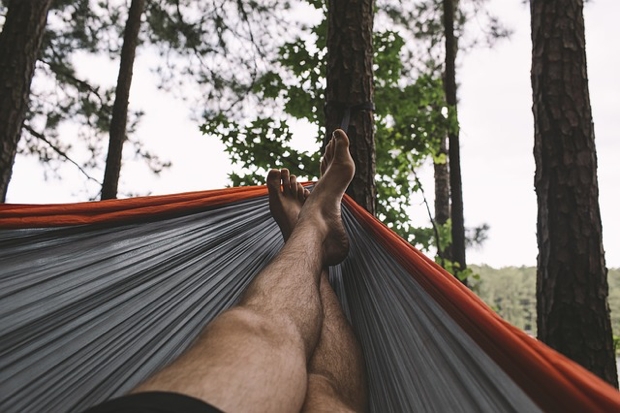
© Mark Tredinnick
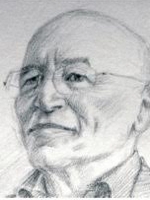
Biloba
by Rolf A. Leeman
Rolf lives on the lovely shores of Lake Zurich, where glaciers once formed the Swiss Plateau -- not too far from the Alps, where glaciers are melting frighteningly fast.

Today's beginning,
an upward shower
of gingko gold held
by an impeccable
ocean of sky blue.
The afternoon storm
has torn them down.
The soil is aflame
with song and sail
cast aground.
© Rolf A. Leeman
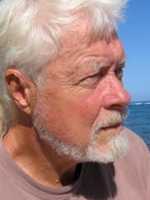
Canada Geese
by Paul Nelson
For most of his adult life, Paul lived just off a tidal marsh and half-time mudflat, half-time “broad” with 11 ft. tides below the marriage of two strong rivers of furthest “downeast” Maine. Canada geese began to winter on the marsh about 20 years ago, altering the annual migrations overhead that he grew up with. Paul lives by the Pacific now, with albatross, boobies and shearwaters, monk seals and turtles.

when they must land
scaling down for sheared corn
wheat and hayseed
or to pick at dried cow flops on hard
acres at the edge of seasons
or for tiny snails on the marsh
strung like beads on eel grass and reeds
they cease their yearning songs
that call men bristling
trigger fox and coyote
yet gabble harmonically
in wide fields safe as reservoirs
away from trees and stealthy shadow
saving their lives for cruising
thermals waves currents and tides
like notes on rhythmic staves
alto saxophones and clarinets wavering
antiphonal to our quavering prayers
our looking up for voices
to bring down and still them
because we cannot fly
singing across the moon’s face
© Paul Nelson
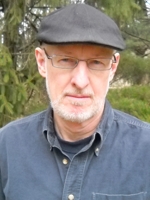
Cherokee Fields
by Dave Worrell
Dave lives in the Lower Delaware Watershed, between the Pennsauken Creek and the Cooper River in South Jersey.

After Cherokee Field
Oil on canvas
By Catherine Kuzma
These russet-dark nearly leafless trees are all
that remains of the bulldozed woods cut down
to make space for seven ballfields—standing empty,
day after day, at Cherokee High School.
But the painter
aims higher, far above the chalk lines and goal posts.
Silhouetted maples and sycamores the only earth-
bound beings here. All the rest is lemon meringue
late-day sky, overlaid with apricot clouds—and angry
ones too: indigo slate, darkening toward black.
As a boy, I played ball on nearby sandlots—became what I am.
In the tree-line, far left: a human figure? Are even more
lurking amidst the sepia trunks and branches?
This once
was woodlands where the Lenape trapped rabbit, gathered
huckleberries; their arrowheads still litter the nearby trails.
© Dave Worrell
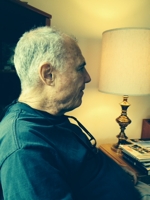
Contrail
by Bob Perkins
Bob lives on the California coast in the Santa Monica Watershed.

A jet fuel paper cut
on the sundown sky,
looks clean, shines white,
then bleeds out,
bubbles, scabs,
raises flesh,
and dissipates
leaving its transparent carbon scar,
one of a thousand scars this day
© Bob Perkins
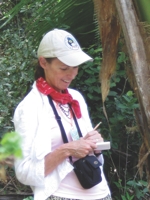
Crossing the Wallace Line
by Sandra Noel
Sandra lives on Vashon Island in Puget Sound under the shadow of Mount Rainier in the middle of Vashon-Maury Island Watershed, a 37-square-mile area, among about 10,000 humans and many more northwest species of birds, fish, mammals, insects and giant trees.

A full moon spills her silver light over the bay
Teku’s beach is glittering with sea shells and plastic trash.
Just offshore, brave fishermen in small outriggers
bob like toy boats too fragile to survive
the dark wave shadows rolling in
from an off shore typhoon.
I am just a visitor here
without the necessity of bravery
but trying to fit in, to be easy
because I cannot think of another place on earth
I would rather be than under these stars
on this island where Wallace drew his imaginary line
and creatures born in evolutionary isolation
still struggle to survive until the next fire
the next desire for hardwood or hard-ons
more land or bush meat.
With palm frond pen
I draw a line in the sand
between perfect shell and plastic lighter
as if I could stop what is coming–
the great grinding wheel of greed
rolling over forests, beaches, species.
So many others have tried and failed
the line is broken a thousand acres a day
and so they leave, having done (almost) nothing
learning only to love what they cannot save
and living with that hard truth every day, every day
but trying anyway.
© Sandra Noel
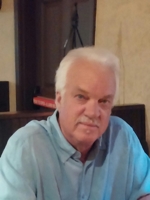
Hashim
Essaouira
by Tim Applegate
Tim lives in the foothills of the coastal range in western Oregon.

A feral cat, pale as smoke, paws at a fishbone
wedged into the rocks at the edge of the harbor
where the fishermen clean their daily catch.
At his window, Hashim watches the cat
slink away and disappear
in the shadows of the ramparts. Then
he closes the curtain and turns back
to his bowl of tagine, cup of mint tea,
book of ancient verses.
Tomorrow, they say, the wind will rise like wrath
and build towering walls of water, but Hashim
is unafraid because he knows
that everything was written long ago.
Written in the sand, carved in stone, slashed
into the bark of the argan trees.
He falls asleep
whispering the familiar verses.
In his dream a blue boat
breaks loose from its mooring and floats
out to sea, the fog’s only color.
© Tim Applegate
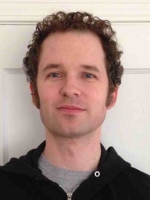
In Seven Erstwhile Cities
by Cal Freeman
Cal lives and writes in Dearborn, Michigan, in the Rouge River watershed.

The dead have not been delivered
their canes or walking shoes.
In two outfaced towers,
two watchers see the pulses
of bipeds in infrared
and see the lit ends of
their cigarettes with naked eyes.
In three dozen empty houses,
past scenes of trauma play
upon the walls
as if those walls were screens.
In Franco’s Spain
the spirit of the dead keeps
winning,
and it is clear to anyone
who listens
that the hillside stone
can speak.
In Laos, in the Plain
of Jars, some shattered
monuments persist
and the giants sleeping
deep within their lidless
casements savor the lack
of footsteps and the gradual
ensoulment
of unexploded ordnance.
© Cal Freeman

Letter to Mardie Ratheau
Marlboro, Vermont
by Susan Lanier
Susan lives just above the Arroyo Chamisa, which offers passage to coyotes, bears, the spring-returning mountain lions; passage north to Sun, Moon and Atalaya Mountain or south to the sprawling, drier areas of high desert in the Santa Fe watershed.

when I showed you where I waited
beside the stone wall tucked under
my plastic camouflage poncho
bobbing my head like branches
in the breeze scanning
listening to every dry leaf
shift so still I began to lose
definition like an abandoned house
loses shingles the wind weaseling
through...
when I told you how all I heard
at first were taps like a dog’s nails
on concrete then saw trotting
up the wobbled stone wall not looking
at me but in seconds to pass
three feet from my face a full grown
fox too many colors to remember
possibly rabid my legs tangled
when I told you I couldn't tell if he saw me
his eyes alert for the flush poised to strike
and you asked me Was it
a dream?
stunned I said
No. I was never more awake.
I meant to stay calm
I meant to remain invisible
and what I meant to say to you
was
if I were dreaming
then everything is a dream
and in it a fox the color of dry leaves
urine-burned bark sumac berries
mushroom ash floats
over stones and looks
through me as if
I were air
© Susan Lanier
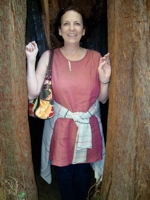
Migration
by Cathy Barber
Cathy lives in the Poplar Creek watershed on California's San Francisco peninsula although, as far as she knows, there is no remaining Poplar Creek.

I.
They were the imagination
of our planet. Let us have a bird
that lives here and spirals so,
and migrates in a sky-blanketing
single movement from Quebec to Texas.
Was it early? Was it late?
Cabinets are filling still with taxidermy,
labeled and marked
for date of expiry.
Are wrens and robins
better than the Dodo?
Three wishes, which would you choose?
Wings quiver with vibrancy and compression.
Five thousand blackbirds and starlings
plummet in Arkansas.
II.
Giant Moa
Gone.
The giant of New Zealand.
Twelve-feet tall, five hundred pounds,
with featherless leg/trunks.
Maori drove these reddish freaks
into pits to kill, rob their nests.
Just three centuries before Europeans landed,
just that tiny window before 1500
when the boats began to land.
What a scare those creatures
would have given the sailors,
what a useful beast
that Moa might have been.
III.
Heath Hen
The last one was seen, recorded
1932, West Tisbury, Martha’s Vineyard,
Massachusetts. She scuttled under a low bush
and became the last.
She had a witness but not a name.
Perhaps we could put a pin in a map,
have a toast with warm and comforting
tea, maybe with a bit of spice,
and name her, honor her, for feeding
the indentured laborers, the settlers,
no doubt the Wampanoag, the French
and the English, whoever arrived.
IV.
Passenger Pigeon
The numbers would amaze.
Billions. Why passenger? Who did they carry
or what were they carried on? The currents,
their plans. Gregarious, they are said,
as though they had a bird personality for
parties and friendship.
Pike County, Ohio, March 24, 1900,
the last one was captured, and zoo-ed and named Martha,
after the wife of the father of our country.
A mourning dove, but different.
Those blasts of migration must have been
spectacular. Like Blue Angels that covered miles
of above, speeding overhead, darkness and light
simultaneously. They overdid it, those pigeons,
and so did we. How could we have known
the acres and acres of nests and broken branches
and bird talk heard for miles would not suffice?
How could such surplus erase?
V.
Thick Billed Ground Dove
Pile Builder Megapode
Antillean Cave-rail
South Island Snipe
Mauritius Night Heron
Reunion Night Heron
Rodriguez Night Heron
Ascension Night Heron
Paradise Parrot
Reunion Owl
Alaotra Grebe, 2010
"Migration" was published in Cartagena
© Cathy Barber

Morning News
by Andrena Zawinski
Andrena lives in Ballena Bay on Alameda, an island off the Oakland estuary in San Francisco Bay, where besides the regular stingrays floating by, an occasional seal wanders in under a boisterous Pacific Flyway.

This morning, the heron huddled into himself,
head buried deep inside the ruffled tuft,
long bill aimed at bracken edging the bog,
thin plume arched up in victory, having had his fill
of a new clutch of downy-backed ducks.
A tern picked open a stingray at low tide
at sunset, swatch of shoreline awash in blood,
and I watched the red of it, redder
than fishers’ rock cod off trawlers at Pillar Point,
merciless gulls a scramble of screeches
for castaway scraps. And just down the shore
a seal pup beached, face slit mouth to cheek,
hook bleeding the sand, flies a frenzy in its face.
This morning, life seems quite hopeless. Just listen
to the early news, how it uproots silence, sends it
wild as wing beats thrashing into the wind,
chipped by words, by the fact that
nature can be such a terrible beast.
© Andrena Zawinski
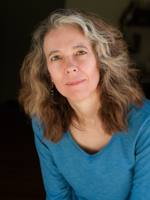
My Daily Crows
by Erica Goss
Erica lives less than a mile from the Los Gatos Creek, home to a variety of migratory waterfowl and a former homeless encampment.

Their peppercorn voices,
their constant
need to talk: how quickly
they track my habits,
flying in and out
of my thoughts. Corvus,
jackdaws, ravens,
fishers, mathematicians,
athletes, schemers, scavengers.
I know they’re watching me.
They cross the street at my heels.
My food makes them smart.
I change things – they adapt.
Counterstrategy is the game.
I feel their wings in my hair.
They are the future:
the dark energy of my dormant faith,
my black sons and daughters.
Previously published at Escape Into Life
© Erica Goss
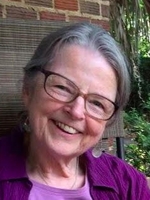
Not One Thing Bright
by Florence Dacey
Florence lives in the Cannon River watershed in Northfield, Minnesota.

I hoard the gold
of poplars, silver bark of birch
till they brown in earth
and fade as we do
under the witness of trees.
My bulls and bears
trample and snarl at my need.
I’ll eat each slice
of moon’s shadowy bread.
Live on waves.
Dash on rocks.
Nothing keeps me safe
as colors found then squandered.
Not paper made to buy our separation.
Not one thing bright that cost a life.
© Florence Dacey
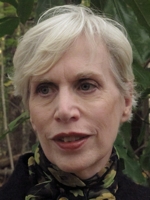
On the Beach
We came upon shells, mounds of shells, many ancient and weathered
and gleaming white against the white-gray sand.
— Edwin Way Teale, from North with the Spring, “Seashell Islands”
by Valerie Nieman
Valerie lives in the shade of a mammoth tulip poplar at the headwaters of the Cape Fear watershed.

So many, such lives:
oysters relentlessly seining
the sea, mussels too,
draining the insubstantial, parting
the water from the waters,
scallops improbably hunting
on jet drive, oyster drills
drilling, whelks inserting
a toothed foot into the soft
flesh of their brethren, coquinas
rolling out of Carolina sand
with each wave
and furiously reburying,
in such numbers that even with flesh
tiny as baby’s fingernail,
the multitudes, aggregated,
would boil into a hearty broth.
Such onetime lives:
carbonate castles
knitted up from the waves,
emptied, become home
to hermit crabs
trying on the concavities
of the columella
into which their soft abdomens
like size-10 derrieres in size-8 jeans
are snuggled—
sometimes a wholesale
resettlement,
the largest, finding a
greater gastropod,
moving on up, and the next
taking his former abode,
down to the least
and miserable clinger
to a sponge or a worm shell
now claiming a tiny palace.
Appeared in a longer form in North Carolina Literary Review and the author's new book of poems, Hotel Worthy.
© Valerie Nieman
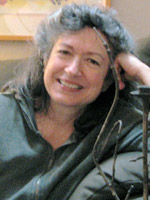
River Trail
by Susan Kelly-DeWitt
Susan lives in the Lower Sacramento Watershed, about two miles from where the Sacramento and American Rivers meet.

I hate to disturb the dragonflies
in their zinc-flecked flight through
the reeds through the spikelets
of deer grass
their stickpin glit darting before me, zip
and zigzag
one
two
three
four
five
of them, dazzle and dip, among the diatoms—
as I put one blind foot before the other,
as we all must do sometimes.
© Susan Kelly-DeWitt

Strawberry Mulching
by Kevin Casey
Kevin lives in Maine by the banks of Black Stream and enjoys hearing it fall toward the Piscataquis River on its way to find the sea.

The flat bed rumbled like a lobster boat,
while the foreman heaved another bale of straw
from its back onto the frost-gripped ground.
Flanneled and steaming in the pale, fall morning,
the team of us picked and pried at the twine-tied
bale with our pitchforks like weary birds,
then tossed and scratched a separated mat
of straw across the clumps of rust-edged leaves
and runners reaching for their own plot of soil.
A boy’s first job and eager to please,
I felt the weight to save each plant along
my row -- each mother and tethered child --
from the scorching winter winds to come.
But the foreman, seeing me fall behind,
took the smooth ash handle from my grasp
and, throwing a patch that flattened jade pleats,
said, ‘We don’t have time to be so careful.’
Three quick scratches, and he ratcheted forward
with those cold, rigid tines. Three more drags, leaving
gaps in the thatch to leak green up to the sky.
And this is the way with work since then,
whether both drudgery and diversion --
that time will take the care from my hands,
while plans trail behind in half-tended rows,
with each fading day growing shorter.
© Kevin Casey

We Dig the Graves
by Carlie Hoffman
Carlie lives between the Hudson and Harlem Rivers.

We wait for night to return
to the river, our hands now cold and capable
carrying the shovels. Our feet
dampened with reeds. In new light
the sunk gulls surface, pale bellies
turned upward like teeth. Already
the evidence disassembles. I ask what happens
after the need to keep other worlds
at their distances, each with their own
cruel sun to kneel beneath.
We search wet ground for evenness,
we dig the graves to bury the stiff, white birds
along the riverbank, turn away from them.
Beside a thicket, a pair of black-tails
fold their bodies on the cusp
of sleep, infant antlers
darkened by cloud. To kill
is unremarkable. Who lied to you.
© Carlie Hoffman